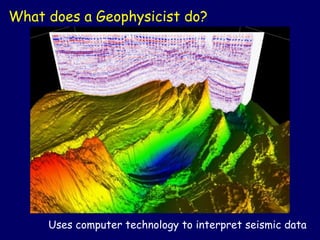All Categories
Featured
Table of Contents
Geophysical Consulting in Eden Hill Aus 2020

Other possible geophysicist majors that aren't geophysics or geoscience consist of: Atmospheric sciences and meteorology Chemical and physical oceanography Earth science Environmental science Hydrology and water resources science Products science By making any geophysicist degree, and by taking the necessary geology courses, you ought to certify for an entry-level position as a geoscientist or geophysicist.
Eventually, students must discover: a branch of geology that looks at the various elements of minerals, including chemical composition, internal crystal structure, and physical properties. the study of rocks and the procedures and conditions that form and transform them over time. There are a couple of neighborhoods in this branch of geology, consisting of igneous, metamorphic, and sedimentary rocks.

This field takes a look at structural rock functions such as cleavage, faults, joints, and small folds. They need to likewise discover the computer abilities necessary to: examine data create digital models and maps operate geoscientists' software Trainees must also take advantage of all opportunities to get real-world experience. Ambitious geophysicists should anticipate to hang around learning: in the classroom in the field in labs Obviously, skills taught in the class are really crucial for striving geophysicists.
What Does A Geoscientist Do? in Henley Brook Western Australia 2020
Geoscientists spend a lot of their time outside when working in the field, so they should possess "outside skills" like outdoor camping and operating boats, airplane, and other lorries. Because they spend a lot time in remote locations, it's vital that geophysicists also have the physical endurance to carry essential equipment on their hikes to areas of study.
The task uses: a high average and top profits a high rate of individual fulfillment amongst geophysicists low work tension positive task outlook Further details on earnings potential and task outlook is detailed below. For students seeking to land an entry-level role as a geoscientist or geophysicist, it takes 4 years, or the time needed to complete a bachelor's degree in geophysics or a related discipline.
Some research study positions in geophysics need doctoral degrees. Also, if you prepare to teach at a college or university, you should make a Ph - Geophysicist: Job Description, Duties And Requirements in Winthrop Western Australia 2020. D. in geophysics or an associated field. The time it requires to make a Ph. D. differs by organization and program, however it typically takes 4 to 6 years beyond the bachelor's degree.
How To Become A Geophysicist in Lockridge Western Australia 2021
In truth, the majority of employers require candidates to have a bachelor's degree in geophysics or a carefully related discipline for all entry-level positions. And, in some cases, employers need a master's degree. As a result, there's no other way around the degree requirements for becoming a geophysicist. Many companies will expect or require a practicing geologist to be accredited for positions beyond those at the entry level.
Currently, 31 states require licensing for geologists, although licensing is not constantly needed, especially for entry-level work. The states that do problem licenses utilize the Principles of Geology Exam (FGE), which is administered through the National Association of State Boards of Geology (ASBOG). Now that you know which degree for geophysicist jobs you need, you'll require to land a task, and it's important to find out just how much cash you can make in this career.
According to BLS, the average annual wage for geoscientists is $93,580. The lowest 10% of earners make less than $52,000, while the greatest 10% earn more than $201,000 each year. Earnings fluctuate by industry type and geographic location. According to BLS, certain industries offer greater wages for geoscientists, and in many cases, they offer higher-than-average profits.
Geophysical Survey Requirements In California Waters in Ashfield Australia 2020
In truth, mining, quarrying, and oil and gas extraction provides over $32,000 more yearly than the average annual wage for this occupation. The federal government, too, offers over $10,000 more in revenues than the nationwide average for geoscientists. In addition to industry type, geographic place can greatly impact earnings for this occupation.
The top-paying states and their annual mean incomes, according to the BLS, include: Texas $166,720 Oklahoma $149,630 Pennsylvania $120,590 Hawaii $120,130 Colorado $107,260 These 5 top-paying states offer much higher salaries than the average for this occupation. In fact, salaries for geoscientists in Texas are over $73,000 higher than the national average.
It must come as not a surprise that most of these high-paying areas are in Texas and Oklahoma, but some are found in California, Louisiana, and Colorado. The leading 10 highest-paying metro locations for geoscientists are: Houston-The Woodlands-Sugar Land, Texas: $188,400 Tulsa, Oklahoma: $186,490 Midland, Texas: $167,040 Odessa, Texas: $147,080 Oklahoma City, Oklahoma: $145,350 Bakersfield, California: $130,080 Urban Honolulu, Hawaii: $124,470 New Orleans-Metairie, Louisiana: $121,030 Washington-Arlington-Alexandria, DC, VA, MD, WV: $120,180 Denver-Aurora-Lakewood, Colorado: $116,910 For some geoscientists and geophysicists, living in a metro city is not as appealing as living in a smaller neighborhood.
Latest Posts
Geophysical Surveys - U.s. Geological Survey in Wandi Western Australia 2023
Geophysics in Mount Claremont Aus 2020
Geophysical Survey in Casaurina Aus 2020